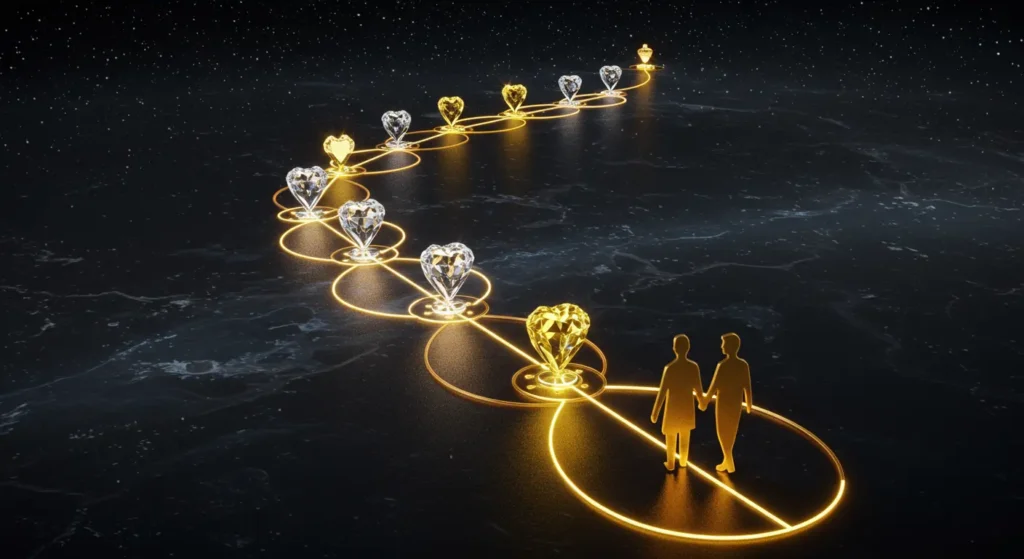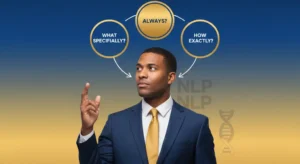Struggling to communicate with your partner, friends, or coworkers, no matter how hard you try? You’re not alone. Misunderstandings, emotional triggers, and clashing values can quietly erode even the most important relationships.
But here’s the good news: building stronger, more fulfilling connections doesn’t have to be a mystery. With the right tools, you can shift how you communicate, understand others on a deeper level, and resolve conflict before it spirals out of control.
In this article, you’ll discover top key practical strategies like how to use sensory language, release emotional baggage, challenge unhelpful beliefs, and build real rapport. Whether you’re looking to deepen your romantic relationship, improve your family dynamics, or connect better at work, these techniques will help you grow more conscious, confident, and connected.
Understanding NLP and Timeline Therapy: What Are They?
Neuro-Linguistic Programming (NLP) is a powerful method that explores how we think, speak, and behave. It gives us tools to recognize communication styles, break patterns that don’t serve us, and build better rapport with others.
Timeline Therapy™, developed from NLP, is a technique that helps you release unresolved negative emotions (like anger, sadness, or fear) and limiting beliefs stored in your subconscious. Think of it as a way to let go of emotional baggage that’s silently sabotaging your relationships.
Key Strategies to Enhance Relationships Using NLP and Timeline Therapy

Struggling to feel heard or understood in your relationships, even when you mean well? That’s often because deeper patterns like past experiences, limiting beliefs, or emotional baggage quietly shape how we connect. NLP and Timeline Therapy are powerful tools that help you shift those inner blocks, improve communication, and build stronger, more authentic relationships. In this article, you’ll learn 8 key strategies to create lasting change from the inside out.
Why Relationships Need a Mindset Shift
Whether it’s with your partner, your team, your boss, or your friends, strong relationships are built on understanding, trust, and healthy communication. But sometimes, despite our best intentions, conversations feel frustrating, emotions run high, and we just don’t feel heard. Why?
The answer often lies deeper than surface-level communication. Our past experiences, limiting beliefs, and unconscious emotional patterns quietly influence how we relate to others. That’s where Neuro-Linguistic Programming (NLP) and Timeline Therapy come in as two powerful personal development tools that help you shift your mindset, improve your emotional intelligence, and ultimately enhance every relationship in your life.
Clear Out Emotional Baggage with Timeline Therapy
Let’s be real: we all carry some emotional baggage. Whether it’s childhood wounds, heartbreak, past rejections, or career setbacks, these experiences can leave emotional imprints that affect how we react today.
Timeline Therapy is a proven method that helps you release unresolved emotions like anger, fear, guilt, and sadness by working with your unconscious mind. Instead of just “coping,” you’re able to let go of old emotional patterns that no longer serve you.
For example, have you ever overreacted to a small comment from a partner or colleague? That strong reaction likely wasn’t about them, it was about something unresolved within you. Timeline Therapy helps disconnect those triggers, so your reactions become healthier, calmer, and more in line with the present moment.
Break Free from Limiting Beliefs and Complex Meanings
We all have internal stories and beliefs like:
- “I’m not good enough.”
- “People always leave.”
- “I’m not ready.”
- “They don’t respect me.”
These limiting beliefs can sabotage your relationships from the inside out. Timeline Therapy helps identify when and where these beliefs were formed and gently release them so you can create new, empowering ones.
It also helps you release what NLP calls “complex equivalences,” that’s when we assume something means something else, like:
- “If my partner doesn’t text back quickly, they must not care.”
- “If my boss gives short feedback, they must be upset with me.”
These assumptions often aren’t true, but they drive how we feel and behave. Releasing them opens the door to clearer, healthier communication.
Improve Communication Through NLP Language Patterns
Every person communicates in a slightly different way; some people speak in pictures (visual), others in feelings (kinesthetic), or sounds (auditory). NLP helps you recognize your own style and understand others’ styles so that your message lands with more clarity.
It also teaches you how to adjust your “chunk size” Some people want big-picture overviews, others need detailed steps. If you’re too vague, they get confused. If you’re too detailed, they tune out. Learning how to “chunk up” or “chunk down” your communication based on who you’re speaking with creates instant connection and better understanding.
Align on Values for Deeper Connection
Values are the invisible rules we live by. When values clash, whether in a marriage, friendship, or workplace, conflict naturally arises. For example, if one person values freedom and the other values stability, they may struggle to make joint decisions.
NLP helps you discover your own core values and explore how to align them with those around you. In coaching or corporate settings, this often leads to better teamwork, fewer misunderstandings, and clearer shared goals.
Think of it like this: a lightbulb spreads energy everywhere, but a laser (which is focused and aligned) can cut through steel. When your values are aligned with others’, your relationships gain that laser focus and become more powerful and effective.
Build Real Rapport and Trust
NLP also gives you simple tools to build rapport and the feeling of being on the same wavelength. When you match someone’s communication style, tone, or energy, they feel seen, heard, and respected.
People do business with and build relationships with those they know, like, and trust. Whether you’re dating, networking, managing a team, or building friendships, rapport makes all the difference.
Using NLP to develop rapport means fewer misunderstandings, easier conflict resolution, and deeper connections.
Conclusion: Ready to Transform the Way You Connect?

At its core, NLP and Timeline Therapy offer more than just tools they create a mindset shift that transforms how we connect with others. By clearing emotional baggage, challenging limiting beliefs, and communicating more intentionally, we can build stronger, healthier, and more fulfilling relationships.
Even small changes like using someone’s sensory language or reframing a negative assumption can spark meaningful improvements. Start with one or two strategies, and you’ll be surprised how quickly your connections begin to grow with more trust, empathy, and clarity.





